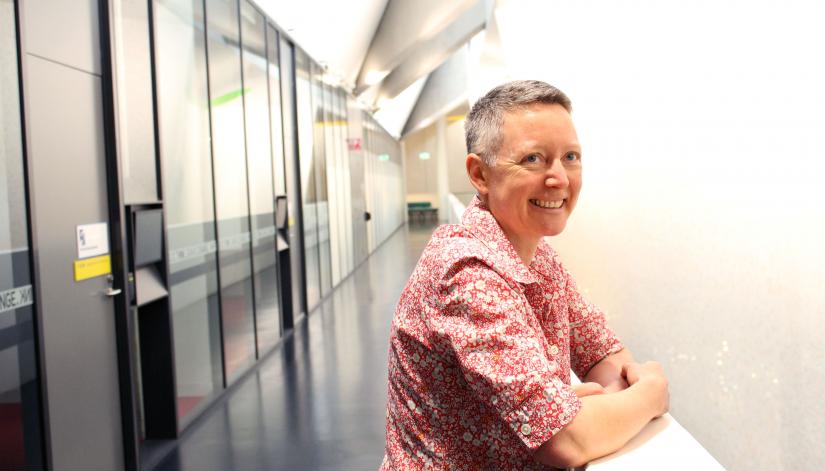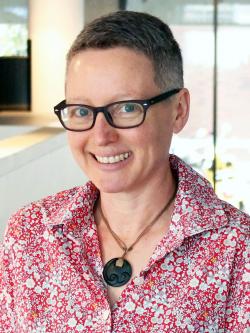When it comes to health, sometimes our genes let us down. So, how do health professionals help people to cope with genetic conditions and risks? UTS Graduate School of Health is in the process of developing a brand new Masters degree in genetic counselling which would be offered in February 2019. We sat down with Dr Alison McEwen who recently joined the School.

Associate Professor Alison McEwen, genetic counselling, GSH. Image credit: Jim Woulfe
Dr Alison McEwen comes to UTS from Genetic Health Services New Zealand, where she worked as a senior genetic counsellor. She was also a clinical lecturer for Otago University Wellington. Alison is currently the Honorary Secretary for the Human Genetics Society of Australasia (HGSA), and was previously the Chair of the HGSA Board of Censors for Genetic Counselling during the period when the training and certification guidelines underwent a substantial review.
What is genetic counselling?
Genetic counsellors are allied health professionals who work with individuals and families with an inherited genetic condition. The role is primarily about communication and tends to be a short-term therapeutic interaction about the risks, consequences and nature of the genetic condition, the probability of developing or transmitting it, and the options for management and family planning.
Who might need genetic counselling and at what time in their life?
At any time. We work with people from prior to conception through to after the death of a family member, and people seek help for a huge range of different conditions. One of the more widely publicised groups are people with a family history of cancer. Angelina Jolie’s announcement in 2013 that she’d had a risk-reducing double mastectomy because she carried a mutation in a BRCA gene, for example, led to a surge in people seeking genetic counselling.
In the future, I think we’re going to use genomics to contribute to overall wellness. I think the role of genetic counsellors is going to expand hugely.
How does the counselling help?
It gives people the opportunity to consider the complex scientific information in a safe environment with the support of somebody who can translate what it means practically, in terms of the decisions and choices they might want to make. Genetic counselling also acknowledges the emotional impact and helps with the adjustment process, which may include grief and loss.
Who might be interested genetic counselling?
We are designing the course to be accessible to people from a wide range of backgrounds, as well as students going from their undergraduate or honours degree straight to a Masters. Historically, genetic counselling has attracted people from professions including social work, midwifery, nursing and lab scientists looking for a more human angle to their work. I came from a teaching background.

What are the career pathways for a genetic counsellor?
There are the well-established routes of working in clinical practice or going into research, but the profession is at an exciting turning-point from a technological aspect. We can now sequence significant proportions of a person’s genome - so not just looking at a single gene but a whole lot of different genes. This is providing us with information we’ve never had access to before, for example how people metabolise medications which has important implications for prescribing.
In the future, I think we’re going to use genomics to contribute to overall wellness, particularly in common chronic conditions like cardiovascular disease and diabetes. I think the role of genetic counsellors is going to expand hugely.
What will set this course apart?
This will be a unique course with wonderful opportunities to train alongside, and explore synergies with, other allied health professions including pharmacy, clinical psychology, orthoptics and physiotherapy. In addition, because we are developing this course in a rapidly-evolving time, a key feature will be its responsiveness to the changing technological environment.
What makes you passionate about the field?
I started getting interested in this field following a personal experience where genetic counselling would have been really helpful. In between my two daughters I became pregnant with a baby who, at the ultrasound, was identified as having lethal congenital abnormality. The factual information I received was helpful, but the delivery of the information by various health professionals could have been improved. That experience helped to ignite a passion to work in the area and help others who might face a similar challenge.
Can you help?
Dr McEwen is undertaking a consultation process with the genetic counselling community across Australia and New Zealand to ensure the Masters in Genetic Counselling best reflects the needs of the profession. If you have any ideas to share, please contact: Alison.McEwen@uts.edu.au

